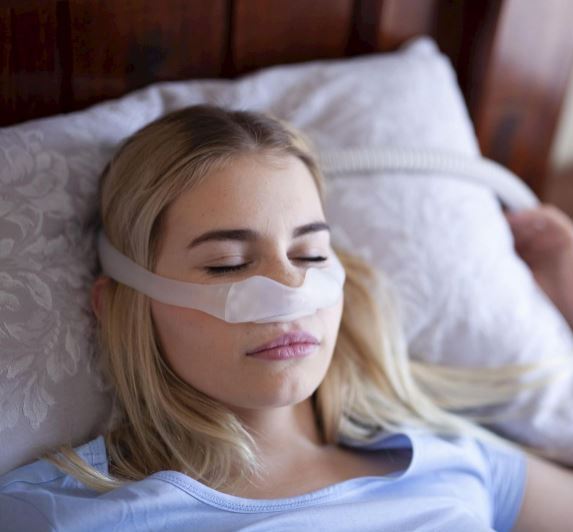When you’re struggling to sleep, you’ll do whatever it takes to catch some Zs. Flip positions. Swap pillows. Change locations. As the hours go by, you try anything and everything in search of that one thing that will make all the difference and deliver a good night’s sleep.
Well, almost anything.
Of the 22 million people who suffer from sleep apnea, more than half will avoid or abandon a surefire solution to solving their chronic sleep problems: A CPAP mask and machine.
 A CPAP machine is the go-to sleep apnea treatment for a reason.
A CPAP machine is the go-to sleep apnea treatment for a reason.
Sleep apnea is caused by blockages or neurological issues that restrict your airways and affect your breathing at night. The simplest and most effective treatment is to keep the air flowing so you keep breathing.
That’s what a continuous positive airway pressure (CPAP) machine does. It delivers a steady stream of air into your nose and mouth while you sleep so that your airways stay open. And it's very effective.
If you use it.
“CPAP machines have years of great evidence and are truly the gold standard for treating sleep apnea. For many people, CPAP machines are very effective when they are in use on a nightly basis,” says Tyler Bertroche, MD, an ENT surgeon and sleep expert at The Iowa Clinic West Lakes Sleep Center. “However, this therapy just can’t work if you don’t wear it.”
Despite their effectiveness with regular use, these sleep apnea machines are sometimes seen as cumbersome, inconvenient, and uncomfortable. Some people struggle with a CPAP for a few months — maybe a year — before abandoning it altogether. Others refuse to even fill the prescription to get the sleep device.
“If you don’t wear it on a nightly basis or take it off in the middle of the night because it’s uncomfortable or don’t take it with you when you travel, then it’s not going to work for you,” Dr. Bertroche says.
The benefits of a CPAP machine far outweigh the costs of sleep apnea.
Ditching your CPAP or avoiding one altogether may be a big mistake. CPAP machines can deliver better sleep on the first night. With regular use, they not only improve your sleep — they provide dramatic health benefits for your heart, lungs and your whole body. All the hidden dangers associated with sleep apnea go away.
Sure, a CPAP machine takes some getting used to. At first, it’s going to feel weird with a mask on your face and a hose dangling by your bedside. And when you’re sleep deprived or just stressing over sleep, everything is a little more irritating.
But today’s sleep apnea machines aren’t as big, noisy and clunky as machines of old. They are smaller than a shoebox, sound like a white noise machine running at a soft whisper and can be customized for your comfort. That’s a small price to pay for quality sleep and reduced risk of serious disease.
“Modern CPAP machines are great because there are many different face pieces you can use to find comfort. Some can go over the entire face and mouth while others just go through the nose. And many offer settings that are very customizable,” Dr. Bertroche says. “It’s a shame when people get set up and, if it doesn’t work right away, just feel like there’s no option for them. But there are really so many different things that we can do with the CPAPs that actually get their sleep apnea under control and get them actually breathing better at night.”
A CPAP machine isn’t a cure-all like an antibiotic that will make your infection go away. It’s more like insulin for diabetes or ACE inhibitors to treat heart failure. It’s an effective tool to treat a chronic condition, but it has to be managed like anything else. As your weight or comfort level changes, you may need to adjust the settings, mask or other features.
“Sleep apnea is just like any other chronic condition,” Dr. Bertroche says. “There are things we can do to change the system to help in many different ways. A lot of it is just continuing to go down that pathway until you are comfortable and getting the rest that you need.”
 A sleep apnea machine isn’t the only device that can resolve your symptoms.
A sleep apnea machine isn’t the only device that can resolve your symptoms.
It’s actually just one of many sleep apnea machines. So if you’ve given up on your CPAP or want to explore your options, there’s a wide variety of devices to overcome your breathing difficulties and manage your condition.
Mouth guards and oral appliances are easy-to-use devices that keep your throat open. Other airway pressure devices, like the bilevel positive airway pressure (BiPAP) machine, deliver more air pressure when you breathe in and less when you breathe out. Newer adaptive servo-ventilation (ASV) devices actually learn your breathing pattern, then deliver air at the right moment to prevent a pause in your breathing.
Those are just devices for outside the body. There are sleep apnea devices that can be implanted inside your body to perform many of the same functions. Inspire Sleep Therapy uses a small device, similar to a pacemaker, to stimulate your internal anatomy to open up your airways at night. There’s no mask, mouthguard or anything else to cause discomfort. You simply click a button on a remote to activate it before bed, then turn it off in the morning.
“One of the benefits of Inspire is that it’s an implanted device. It’s all built in and goes where you go. And when you activate the device with a remote, then it works throughout the night. You don’t have to worry about it falling off or anything like that, says Dr. Bertroche, one of few physicians in Central Iowa trained in this innovative sleep therapy. “You don’t have to worry about a lot of the logistics that people find burdensome with CPAP machines and some people find it more tolerable.”
Similar to CPAP supplies and machines, the Inspire Sleep Therapy device can be calibrated and customized to your body and your condition.
“Inspire does require a surgery, which is performed outpatient, so you head home the same day. After a few weeks, we activate the device and teach you how to use it with the remote control at home,” Dr. Bertroche says. “Over several weeks, we figure out where you’re the most comfortable and getting the rest (and air) you need at night. We make sure that you’re not only feeling better, but that your sleep apnea is properly treated with the Inspire device.”
 The cure for sleep apnea can be found at the Sleep Center.
The cure for sleep apnea can be found at the Sleep Center.
Sleep is critical to your health. It’s not just a way to recharge and feel refreshed or energetic the next day. And once you’ve exhausted the at-home remedies — the pillows, candles, sound machines and tinctures — you need to get to the bottom of your sleep disturbances to ward off long-term health consequences. That requires a sleep study in the West Lakes Sleep Center or in the comfort of your own bed.
“A sleep study is the gold standard for diagnosing sleep apnea and other disorders. By monitoring your heart, lungs and breathing, we get a lot of information that tells us if you have sleep apnea and the severity of it,” Dr. Bertroche says. “We also do a thorough head and neck examination to pinpoint the level of obstruction, be it in the nose, back of the throat, or mouth. Because everybody has slightly different areas of obstruction, we want to match the right patient to the right device or procedure to get the best outcomes.”
“There is really so much that we can do to help people with their sleep apnea,” says Dr. Bertroche. “I just want to make sure that if somebody’s out there struggling with sleep apnea and doesn’t know what to do, we will find out what the problem is and work through it.”


